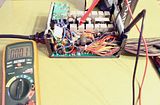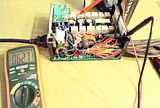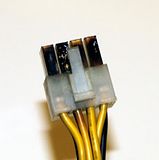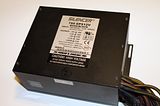I'll be honest. My quest for PC power has corrupted my PC, perhaps irreparably. If you're a serious computer enthusiast then you have certainly heard at least one horror story from someone you know that was using a cheap power supply, that often end up not being so "cheap" in the end.
This story is a bit different. Instead of two cheap power supplies, we had two expensive, highly recommended and highly regarded units that both failed, and for wildly different reasons. Within the time span of two months, no less. As these were review samples neither unit's 5-year warranty is applicable, but both of these units were supposedly some of the best.
The first one is the Cooler Master 1,100W UCP (Ultimate Circuit Protection). This unit was the first 80 Plus Silver power supply to reach market, and was highly recommended based on build quality and safety protections. It had seen two years of use. I can at least vouch for the safety protections as working properly.
The problems began with the system overclock showing instability that was hard to point down. Gradually as the days went by the problems go worse, I'd lower the overclock or adjust voltages to stabilize it again. Probably too quickly I assumed that the CPU I had been using for over a year at 4.2GHz was degrading, because no other logical explanation seemed to fit.
Individually one-by-one I'd replace or switch every single PC component including the PSU to try and resolve the problem. Thanks to hindsight it is clear that when I switched out the PSU, I mistook the GPU driver crashes I'd been experiencing as a sign that replacing the PSU had not resolved the error... so I reinstalled the CM 1,1000W power supply. Duh! Eventually the system got so unstable that at fully stock settings the system would generate Linx errors, Prime errors, and any other stability checking program I'd care to try.
Eventually I noticed a new sound that I had not been able to hear before over the sound of the window AC unit in the PC room, and pinpointed it to the PSU itself... a cycling "bzzzt-tic, bzzzt-tic, bzzzt-tic" sound greeted my ears, only faintly audible even with the AC turned off. I opened it up to find out the cause... and this is why you should never open a PSU yourself unless you have some electrical knowledge and training, including the proper tools like a high voltage detector.
Visually, the unit looks perfectly fine. All caps are intact and pristine, all voltage rails test within specifications, all Vregs are clean. (I had tested inside the system under load as well previously). Then the high voltage detector warned me about the cause... even unplugged, the primary heatsink was generating a voltage drop that shouldn't have been there.
So I plugged it in and fired it up, so far so good, only a 0.1 millivolt reading on the secondary heatsink, which is well within norms from my understanding... (sorry for the photo quality, quick and dirty shots on the green countertop for safety reasons)
Hmm, perhaps not. Even unplugged it would be dangerous to have touched the primary heatsink due to the residual voltage/charge, but this unit is actually powered on here:
The voltage readings spike as high as -097.7 Volts every other second or two. This combined with the sound effects was enough to prove to me this PSU had failed. All of that said, I can say that the safety protections were working properly because the system was never damaged. It was unstable, but no components had failed or been damaged, unlike later...
Next up, was a PC Power & Cooling 750W Quad Silencer. I had this unit for about three years.Technically I still have it, but I'll never be using it in a PC ever again... As of last week, in the middle of a game of Supreme Commander no less, amidst all the smoke and explosions I noticed the special effects were getting a bit too real... I could detect ever so faintly the sickly sweet twinge of singed components, or perhaps dust. I alt-tabbed and shut off Folding@home and tried to find the source of the smell but couldn't, so I resumed the game figuring the central heating system had been mistakingly turned on... Around thirty minutes later nothing was amiss, the game ends and I resume the Folding@Home application (which was generating only a 67% processor load at the time, and is far less demanding than say, Linpack stabiltiy testing with Linx). Hmm, there's that smell again, and it's definitely electronic and not dust... so with resignation I power down Windows, shut off the machine and unplug it and proceed to remove the PSU.
Upon unplugging the EPS12V connector I immediately find the cause, and it isn't pretty. After removing the motherboard I could see the full extent of the damage.
What is interesting is that this was a gradual overload, not a surge. Secondly I never actually once noticed smoke, and the smell was never very strong. Technically both the board and PSU still work (remember I shut the PC down normally), but suffice to say I am using a different board and PSU both now because of this. Having just had to fight to unlatch the connector inside the case I knew it was fully seated and latched, so that wasn't the cause.
From the looks of it I am guessing that there was a load imbalance on the middle 12V wire, as it is noticeably more melted than the others, which are mostly scorched/singed than anything else. This wire started to melt, and when it failed the current load jumped to the remaining three 12V wires instead, which promptly were overloaded and began to fail in turn.
As for how/why this occurred, I am not sure and really would like to ascertain the cause. Could the motherboard have imbalanced the CPU power load onto one pin, or the PSU itself? Furthermore this event strongly reminds me of an ad campaign Antec was running about not all power supplies using OCP on the 12V rails... after seeing this I am wondering if this unit lacked any 12V OCP protection for the EPS12V connection. Given the reputation of PC Power & Cooling, I find it highly surprising if this was the case.
Hm, high voltage warning. Yeah I can believe that. I wonder if the name means 750 watts delivered straight to the EPS12V connector?
So, end of the story... I'm now considering Corsair's new line of AX750-AX1200 professional grade power supplies. The Core i7 920 & a borrowed Core i7 930 were used during the CM UCP escapades, but it appears the recent addition of a 980X was a bit more than the PC Power & Cooling unit could handle.... thankfully no 980X processors were harmed in the making of this thread.
This story is a bit different. Instead of two cheap power supplies, we had two expensive, highly recommended and highly regarded units that both failed, and for wildly different reasons. Within the time span of two months, no less. As these were review samples neither unit's 5-year warranty is applicable, but both of these units were supposedly some of the best.
The first one is the Cooler Master 1,100W UCP (Ultimate Circuit Protection). This unit was the first 80 Plus Silver power supply to reach market, and was highly recommended based on build quality and safety protections. It had seen two years of use. I can at least vouch for the safety protections as working properly.
The problems began with the system overclock showing instability that was hard to point down. Gradually as the days went by the problems go worse, I'd lower the overclock or adjust voltages to stabilize it again. Probably too quickly I assumed that the CPU I had been using for over a year at 4.2GHz was degrading, because no other logical explanation seemed to fit.
Individually one-by-one I'd replace or switch every single PC component including the PSU to try and resolve the problem. Thanks to hindsight it is clear that when I switched out the PSU, I mistook the GPU driver crashes I'd been experiencing as a sign that replacing the PSU had not resolved the error... so I reinstalled the CM 1,1000W power supply. Duh! Eventually the system got so unstable that at fully stock settings the system would generate Linx errors, Prime errors, and any other stability checking program I'd care to try.
Eventually I noticed a new sound that I had not been able to hear before over the sound of the window AC unit in the PC room, and pinpointed it to the PSU itself... a cycling "bzzzt-tic, bzzzt-tic, bzzzt-tic" sound greeted my ears, only faintly audible even with the AC turned off. I opened it up to find out the cause... and this is why you should never open a PSU yourself unless you have some electrical knowledge and training, including the proper tools like a high voltage detector.
Visually, the unit looks perfectly fine. All caps are intact and pristine, all voltage rails test within specifications, all Vregs are clean. (I had tested inside the system under load as well previously). Then the high voltage detector warned me about the cause... even unplugged, the primary heatsink was generating a voltage drop that shouldn't have been there.
So I plugged it in and fired it up, so far so good, only a 0.1 millivolt reading on the secondary heatsink, which is well within norms from my understanding... (sorry for the photo quality, quick and dirty shots on the green countertop for safety reasons)
Hmm, perhaps not. Even unplugged it would be dangerous to have touched the primary heatsink due to the residual voltage/charge, but this unit is actually powered on here:
The voltage readings spike as high as -097.7 Volts every other second or two. This combined with the sound effects was enough to prove to me this PSU had failed. All of that said, I can say that the safety protections were working properly because the system was never damaged. It was unstable, but no components had failed or been damaged, unlike later...
Next up, was a PC Power & Cooling 750W Quad Silencer. I had this unit for about three years.Technically I still have it, but I'll never be using it in a PC ever again... As of last week, in the middle of a game of Supreme Commander no less, amidst all the smoke and explosions I noticed the special effects were getting a bit too real... I could detect ever so faintly the sickly sweet twinge of singed components, or perhaps dust. I alt-tabbed and shut off Folding@home and tried to find the source of the smell but couldn't, so I resumed the game figuring the central heating system had been mistakingly turned on... Around thirty minutes later nothing was amiss, the game ends and I resume the Folding@Home application (which was generating only a 67% processor load at the time, and is far less demanding than say, Linpack stabiltiy testing with Linx). Hmm, there's that smell again, and it's definitely electronic and not dust... so with resignation I power down Windows, shut off the machine and unplug it and proceed to remove the PSU.
Upon unplugging the EPS12V connector I immediately find the cause, and it isn't pretty. After removing the motherboard I could see the full extent of the damage.
What is interesting is that this was a gradual overload, not a surge. Secondly I never actually once noticed smoke, and the smell was never very strong. Technically both the board and PSU still work (remember I shut the PC down normally), but suffice to say I am using a different board and PSU both now because of this. Having just had to fight to unlatch the connector inside the case I knew it was fully seated and latched, so that wasn't the cause.
From the looks of it I am guessing that there was a load imbalance on the middle 12V wire, as it is noticeably more melted than the others, which are mostly scorched/singed than anything else. This wire started to melt, and when it failed the current load jumped to the remaining three 12V wires instead, which promptly were overloaded and began to fail in turn.
As for how/why this occurred, I am not sure and really would like to ascertain the cause. Could the motherboard have imbalanced the CPU power load onto one pin, or the PSU itself? Furthermore this event strongly reminds me of an ad campaign Antec was running about not all power supplies using OCP on the 12V rails... after seeing this I am wondering if this unit lacked any 12V OCP protection for the EPS12V connection. Given the reputation of PC Power & Cooling, I find it highly surprising if this was the case.
Hm, high voltage warning. Yeah I can believe that. I wonder if the name means 750 watts delivered straight to the EPS12V connector?
So, end of the story... I'm now considering Corsair's new line of AX750-AX1200 professional grade power supplies. The Core i7 920 & a borrowed Core i7 930 were used during the CM UCP escapades, but it appears the recent addition of a 980X was a bit more than the PC Power & Cooling unit could handle.... thankfully no 980X processors were harmed in the making of this thread.
Last edited:





